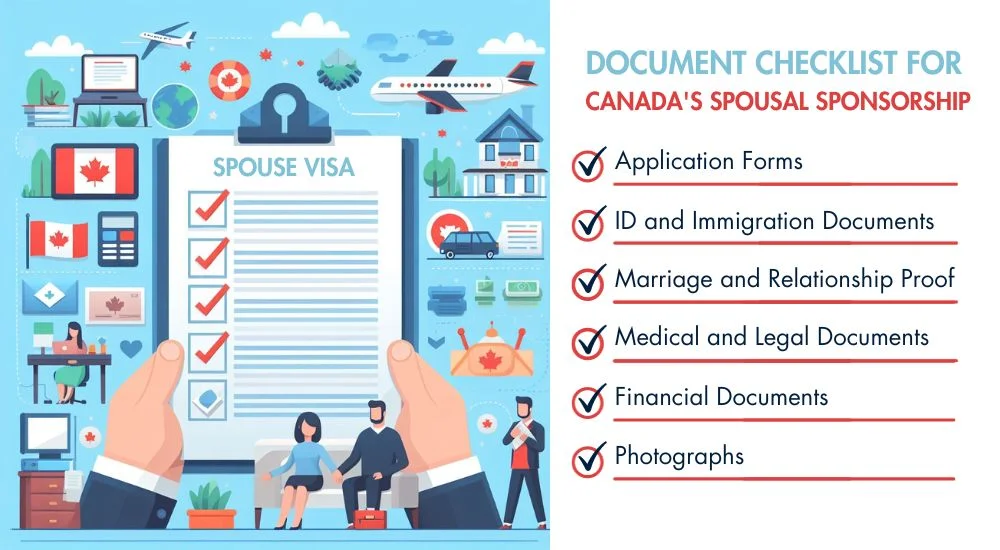How Can You Bring Your Spouse to Canada on a PR Visa in 2024?
If you have recently acquired Canadian permanent residence (PR) and want your spouse to join you, there are several options available to your spouse via the Spouse Visa, also known as the Family Sponsorship program. In 2024, Canada will accept applications by which families can gain Canadian status while maintaining high Canadian immigration standards. Below is a complete overview of the Canada PR visa to help you bring your spouse to Canada.
What is the Spouse Visa for Canada?

The spouse visa program in Canada is an immigration program in which a citizen Canadian or PR can sponsor their spouse/partner, whether married, common-law partner or conjugal partner, to immigrate to Canada. This can be completed while the spouse is in Canada or outside of Canada, providing greater convenience for families that have individuals living in separate countries.
A spouse/partner applying for sponsorship to Canada will be approved for permanent residency and will assume the rights and privileges of any other PR living in Canada. This means the spouse/partner will be able to work, study, and live in Canada without restriction.
Sponsorship Eligibility Criteria
Before you understand the process of applying, it is important that you and your spouse can meet the following eligibility criteria.
Eligibility Requirements for Sponsors
To sponsor your spouse to Canada, you must:
- Be a Canadian citizen or permanent resident: Only Canadian citizens or permanent residents have the right of sponsorship of their spouse.
- Be at least 18 years old: A legal adult.
- Be residing in Canada: If you are a permanent resident, you must be residing in Canada at the time of your application. If you are a Canadian citizen, you must have a plan to return to Canada after your spouse has received PR, while you are living outside of Canada.
- Financially be stable: There is no minimum income requirement for sponsoring you spouse, however, you cannot be in receipt for social assistance for any reason other then disability. You must also sign an agreement which states that you will support your spouse for his or her basic needs.
- No criminal convictions: You need to have a clean criminal record to be eligible to sponsor, specifically including convictions for violent or sexual crimes.
Spousal or Partner’s Eligibility Requirements
Your spouse or partner must also satisfy the following requirements:
- Legally married: For spouses, the marriage must be legally recognized in the country of marriage and in Canada.
- Common-law partner: You must be able to prove that you have lived continuously with them for at least 12 months.
- Conjugal partner: If you have been in a relationship for at least one year but have been unable to live together for extenuating reasons, you can apply under this category.
Procedure for Application for Spouse Visa Canada

To obtain a PR visa for your spouse to come into Canada, you will have to go through several steps and gather information and documents to prepare. Here is the procedure for Application for Spouse Visa Canada in 2024.
1. Obtain the Sponsorship Application Kit
The first step to take is downloading the spouse visa Canada application kit found on the official website of Immigration, Refugees, and Citizenship Canada (IRCC). The application kit contains:
- Instruction guides.
- Sponsorship forms.
- Permanent residence application forms.
It is very important to read all the instructions thoroughly since you can cause delays in your application if you miss or respond incorrectly.
2. Make Sure You Have All The Documents You Need
You and your life partner should be ready to provide these documents:
- Proof of relationship (e.g., marriage certificate, photos together).
- Proof of residence.
- Financial documents showing you can support your spouse.
- Identity documents for both the sponsor and the spouse (e.g., passport, birth certificate).
If the person you’re sponsoring is outside of Canada, police certificates and/or immigration medical examinations might be needed.
3. Submit the Application
After gathering the required documents and filling out the forms, you will now be ready to submit the application package to IRCC. We suggest going over everything carefully prior to submitting to avoid delays in processing.
4. Pay the Processing Fees
The total fees for a Canadian dependent visa for spouse generally include:
- Sponsorship fee.
- Permanent residence processing fee.
- Right of Permanent Residence Fee (RPRF).
These fees can change from time to time but in 2024 they generally range from $1,050-1,500 CAD.
5. Wait for Processing
Once an application is submitted, IRCC will assess the application. This can take different amount of time, depending on how much information is included in the application, the country where the partner lives, and how busy the immigration office is at any given time. Spousal sponsorship application processing times in 2024 are generally about 12 months, but can be different on a case-by-case basis.
6. Interview (If Required)
There are some situations where the immigration office might ask you and your spouse to meet for an interview to confirm the legitimacy of your relationship. The possibility of this happening is low, However, if there are any doubt, detain, or inconsistency in your application this can occur.
7. Medical and Background Checks
Your spouse will need to undergo a medical exam and provide police certificates as part of the process. These ensure that your spouse meets Canada’s health and security requirements.
8. Approval and PR Visa Issuance
Your partner is required to submit their police certificates and undergo a medical exam. This is to ensure that your spouse meets Canada’s health and safety requirements.
Key Points to Ponder before Applying for Spousal Sponsorship for the Year 2024
1. Inside vs. Outside Canada Application
There are two types of applications:
- Inland Sponsorship: This is applicable when your spouse is residing in Canada. For this type of sponsorship application, your spouse remains in Canada while the application is being processed. It is also possible your spouse qualifies for an open work permit while waiting.
- Outland Sponsorship: If your spouse is living outside of Canada, you would apply via outland sponsorship, and the times for processing will differ based on whether inside spouse or outside spouse. Generally, your spouse will require a temporary visa, however, they may qualify to enter Canada, although entry is always subject to the discretion of the Canada Border Services Agency and cannot be guaranteed.
2. Open Work Permit Intended for Spouses
In view of inland applications, it is possible for your spouse to submit an open work permit to allow them the ability to have work in Canada, whilst they await the processing of your humanitarian/PR application. This is an added advantage because it allows your spouse to begin their financial contribution right away.
3. Relationship Proof
The key aspect of your application will be demonstrating that your relationship is real. Providing items that help prove this, such as shared finances, photos, letters, or travels together, can help strengthen your case.
Common Mistakes to Avoid
1. Incomplete Application
Incomplete applications are often the reason for delays. Make sure that all parts of your application are completely filled out, and make sure that you have submitted all required documents.
2. Insufficient Proof of Relationship
Failing to provide sufficient proof can result in delays or even denial. Ensure you submit detailed and diverse evidence of your relationship.
3. Missing Deadlines
If IRCC requests additional documents or information, make sure that you respond promptly to avoid any additional delays in processing.
Conclusion
In 2024, the Canada dependent visa for spouse provides an easy process for you to bring your loved one to you. As long as you have met the eligibility requirements and submitted a well-documented application, you can help expedite the process through your preparation. Be sure to stay on top of regional immigration developments as policies are subject to change.
